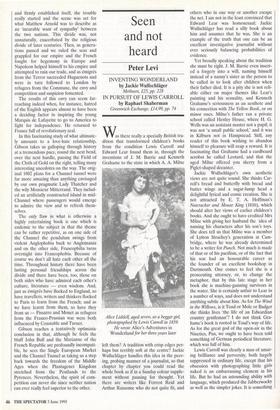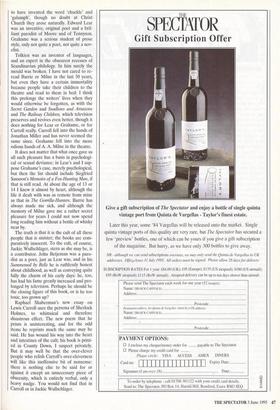Seen and not heard
Peter Levi
INVENTING WONDERLAND by Jackie Wullschlager Methuen, £25, pp. 228 IN PURSUIT OF LEWIS CARROLL by Raphael Shaberman Greenwich Exchange, £14.99, pp. 74 Was there really a specially British tra- dition that transformed children's books from the condition Lewis Carroll and Edward Lear found them in, through the inventions of J. M. Barrie and Kenneth Grahame to the state in which A. A. Milne Alice Liddell, aged seven, as a be; ar girl, photographed by Lewis Carroll in 1859. He wrote Alice's Adventures in Wonderland for her three years later left them? A tradition with crisp edges per- haps but terribly soft at the centre? Jackie Wullschlager handles this idea in the peer- ing, probing manner of a journalist, so that chapter by chapter you could read the whole book as if in a Sunday colour supple- ment without pausing for thought. Yet there are writers like Forrest Reid and Arthur Ransome who do not quite fit, and others who in one way or another escape the net. I am not in the least convinced that Edward Lear was homosexual; Jackie Wullschlager has read a silly book about him and assumes that he was. She is an example of the truth that one can be an excellent investigative journalist without ever seriously balancing probabilities of evidence.
Yet broadly speaking about the tradition she must be right. J. M. Barrie even insert- ed a forgery into a will, naming himself instead of a nanny's sister as the person to be called in to look after children when their father died. It is a pity she is not reli- able either on major themes like Lear's painting and his sexuality, and Kenneth Grahame's seriousness as an aesthete and his connection with The Yellow Book, or on minor ones. Milne's father ran a private school called Henley House, where H. G. Wells was an assistant master not a pupil; it was not 'a small public school,' and it was in Kilburn not in Hampstead. Still, any reader of this book wishing to abandon himself to pleasure will reap a reward. It is fascinating that Grahame had a cardboard acrobat he called Leotard, and that the aged Milne offered you sherry from a Piglet-shaped decanter.
Jackie Wullschlager's own aesthetic views are not quite sound. She thinks Car- roll's bread and butterfly with bread and butter wings and a sugar-lump head a delightful lyrical and comic creation. She is not attracted by E. T. A. Hoffman's Nutcracker and Mouse King (1816), which should alter her views of earlier children's books. And she ought to have credited Mrs Milne with giving her husband the idea of naming his characters after his son's toys. She does tell us that Milne was a member of Lytton Strachey's generation at Cam- bridge, where he was already determined to be a writer for Punch. Not much is made of that or of his pacifism, or of the fact that his son had an honourable career as the founder of an excellent bookshop in Dartmouth. One comes to feel she is a prosecuting attorney, or, to change the metaphor, that by this late stage in her book she is machine-gunning survivors in the water. She is certainly unfair to Lear in a number of ways, and does not understand anything subtle about him. As for The Wind in the Willows, is it Toad or Mole or Badger she thinks lives 'the life of an Edwardian country gentleman'? I do not think Gra- hame's book is rooted in Toad's way of life. As for the great god of the open-air in the Nineties, Pan, we ought to have been told something of German periodical literature, which was full of him.
Lewis Carroll was clearly a man of amaz- ing brilliance and perversity, both largely suppressed in ordinary life, except that his obsession with photographing little girls naked is an embarrassing element in his life. But he had an astounding ability with language, which produced the Jabberwocky as well as the simpler jokes. It is something to have invented the word 'chuckle' and `galumph', though no doubt at Christ Church they arose naturally. Edward Lear was an inventive, original poet and a bril- liant parodist of Moore and of Tennyson. Grahame was a serious student of prose style, only not quite a poet, not quite a nov- elist.
Tolkien was an inventor of languages, and an expert in the obscurest recesses of Scandinavian philology. In him surely the mould was broken. I have not cared to re- read Barrie or Milne in the last 50 years, but even they have a certain immortality because people take their children to the theatre and read to them in bed: I think this prolongs the writers' lives when they would otherwise be forgotten, as with the Secret Garden and Swallows and Amazons and The Railway Children, which television preserves and revives even better, though it does nothing for Lear or Grahame, or for Carroll really. Carroll fell into the hands of Jonathan Miller and has never seemed the same since. Grahame fell into the more odious hands of A. A. Milne in the theatre.
It does not matter that what once gave us all such pleasure has a basis in psychologi- cal or sexual deviance: in Lear's and I sup- pose Grahame's case, merely psychological, but then the list should include Siegfried Sassoon's Memoirs of a Fox-Hunting Man, if that is still read. At about the age of 13 or 14 I knew it almost by heart, although the life it dealt with was as remote from mine as that in The Gorrilla-Hunters. Barrie has always made me sick, and although the memory of Milne gave me a rather secret pleasure for years I could not now spend long reading him without a bottle of whisky near by.
The truth is that it is the cult of all these people that is sinister; the books are com- paratively innocent. To the cult, of course, Jackie Wullschlager, stern as she may be, is a contributor. John Betjeman was a paro- dist as a poet, just as Lear was, and in his Summoned by Bells he is ruthlessly honest about childhood, as well as conveying quite fully the charm of his early days: he, too,. has had his fame greatly increased and pro- longed by television. Perhaps he should be the closing figure of this book, or is he too toxic, too grown up?
Raphael Shaberman's new essay on Lewis Carroll uses the persona of Sherlock Holmes, to whimsical and therefore disastrous effect. The new poem that he prints is uninteresting, and for the odd items he reprints much the same may be said. He has wound his way into the heart and intestines of the cult; his book is print- ed in County Down, I suspect privately. But it may well be that the over-clever people who relish Carroll's over-cleverness will like this inoffensive bit of nonsense: there is nothing else to be said for or against it except an unnecessary piece of obscenity, which is entirely verbal, only a heavy nudge. You would not find that in Carroll or in Jackie Wullschlager.



































































 Previous page
Previous page